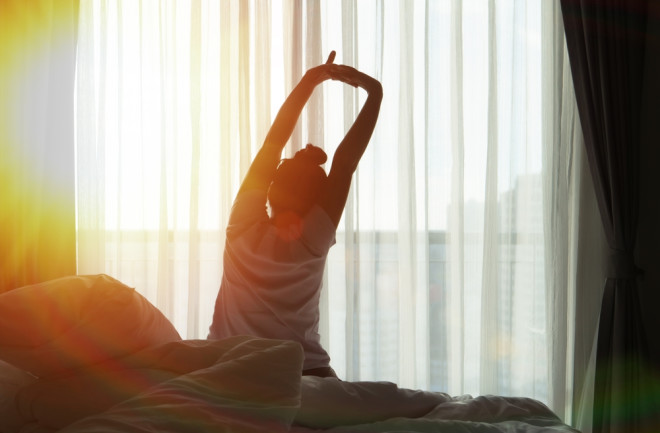What makes a morning person a morning person? If you’re thinking “archaic human ancestry,” then you’re spot on. According to a new paper published in Genome Biology and Evolution, genetic material from the Neanderthals may be actively influencing our modern circadian clocks, turning some of us into morning larks rather than night owls.
“By analyzing the bits of Neanderthal DNA that remain in modern human genomes, we discovered a striking trend,” says John A. Capra, a geneticist at the University of California, San Francisco and an author of the new paper, in a statement. “Many of them have effects on the control of circadian genes in modern humans, and these effects are predominantly in a consistent direction of increasing propensity to be a morning person.”
Read More: The Strange Sleeping Habits of Homo Sapiens
The Origins of Modern and Archaic Circadian Clocks
It is widely accepted that anatomically modern humans arose in Africa around 300,000 years ago, while several species (or subspecies) of archaic humans — the Neanderthals and the Denisovans — originated in Eurasia around 400,000 years ago. Distinguished by their surroundings, these geographically dispersed hominins developed distinct biological and behavioral traits that enabled them to deal with their distinct environments.
While anatomically modern humans evolved in lower latitudes and encountered fewer fluctuations in their day-to-day daylight and temperature exposure, the Neanderthals and the Denisovans experienced extensive seasonal shifts in the environments of their high-latitude homes — a difference that could’ve differentiated their circadian clocks.
What Are Circadian Clocks?
These clocks, also called circadian rhythms, are the innate, internal cycles that control all sorts of important, day-to-day functions in the brain and body, including daily fluctuations in alertness and temperature. These clocks allow animals to adapt their biological and behavioral activities to their surroundings, including their sleep, and they tick away in all types of animals, from insects to mammals.
What Controls Circadian Clocks?
Ingrained in an animal’s genetics, circadian clocks typically coincide with the natural cycles of day and night. And while the sleeping stage of the circadian cycle normally activates at night, the specific timing of that stage shifts, with some species sleeping from early evening to early morning and other species sleeping from late evening to late morning.
Circadian Clocks in Modern and Archaic Humans
The origin and timing of the circadian clock is still shrouded in mystery when it comes to hominins, modern and archaic. Setting out to unravel some of this mystery, Capra and colleagues turned their attention to the genomes of thousands of modern humans and three archaic ones: a 122,000-year-old Neanderthal from the Altai Mountains, a 52,000-year-old Neanderthal from Croatia, and a 72,000-year-old Denisovan from the Altai Mountains.
Read More: How Our Sleeping Habits Helped to Make Us Human
Comparing Circadian Genes: Modern and Archaic
Identifying 246 genes that influence the internal circadian clock in these hominins, Capra and colleagues compared the mutations in modern human genomes to the mutations in the genomes of the Neanderthals and the Denisovan. Their comparisons highlighted hundreds of hominin-specific mutations — special to modern humans or to Neanderthals or Denisovans — that, taken together, may have had important impacts on the function of their circadian cycles.
“By combining ancient DNA, large-scale genetic studies in modern humans, and artificial intelligence, we discovered substantial genetic differences in the circadian systems of Neanderthals and modern humans,” Capra adds in a statement.
Did Archaic Humans Give Circadian Genes to Modern Humans?
On the other hand, the team also identified some similarities in the circadian genetics of modern humans and the Neanderthals, suggesting that our ancient, anatomically modern ancestors had inherited circadian genes from archaic hominins thousands and thousands of years ago.
To gauge the impact of those genes, Capra and colleagues pulled sleep preference information from the U.K. Biobank, a biomedical database containing complete genomes from 500,000 individuals, to investigate whether those inherited or “introgressed,” Neanderthal mutations had any associations with specific sleep patterns in modern humans. They found that many of the mutations increased an individual’s “morningness,” or their tendency to snooze from early evening to early morning.
How Did Modern Humans Inherit Archaic Human Genes?
This inheritance of genes was set in motion some 70,000 years ago. At that time, anatomically modern humans began to migrate from Africa to Eurasia, where they encountered new environments and new hominins. Arriving in the new terrain, these modern humans intermingled with established inhabitants, mating and gaining genetic mutations that were already tailored to the environment.
What Were the Advantages of “Morningness?”
Associated with a shortened period of the circadian clock, Capra and colleagues assert that the genes for increased “morningness” were advantageous to the modern migrants in their new domain, improving their ability to match their circadian cycles to the dramatic seasonal shifts in daylight and temperature.
“This change is consistent with the effects of living at higher latitudes on the circadian clocks of animals,” Capra says in a statement, “and likely enables more rapid alignment of the circadian clock with changing seasonal light patterns.”
Though these hominins had previously evolved in an environment where the days and the temperatures stayed almost the same throughout the seasons, the duration of daylight was much more variable in Eurasia — longer in the summer and shorter in the winter. Thus, the Neanderthals’ shortened circadian period allowed our ancestors to adjust and adapt, with the archaic tendency to sleep and wake earlier being an evolutionary boon.
According to Capra and colleagues, many of the genetic adaptations bequeathed by the Neanderthals to our ancient ancestors were wiped away with time, fading from our genomes because they were bereft of evolutionary benefits. But the Neanderthal-born ability to align circadian cycles with shifting seasons was something special — so special that some of us still possess the adaptation today.
Read More: With Long Necks and Vicious Predators, How Exactly Did Dinosaurs Sleep?

